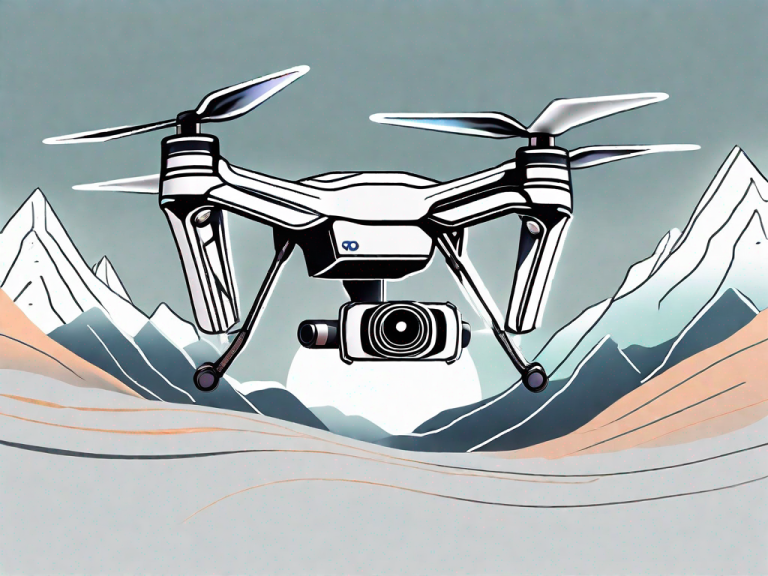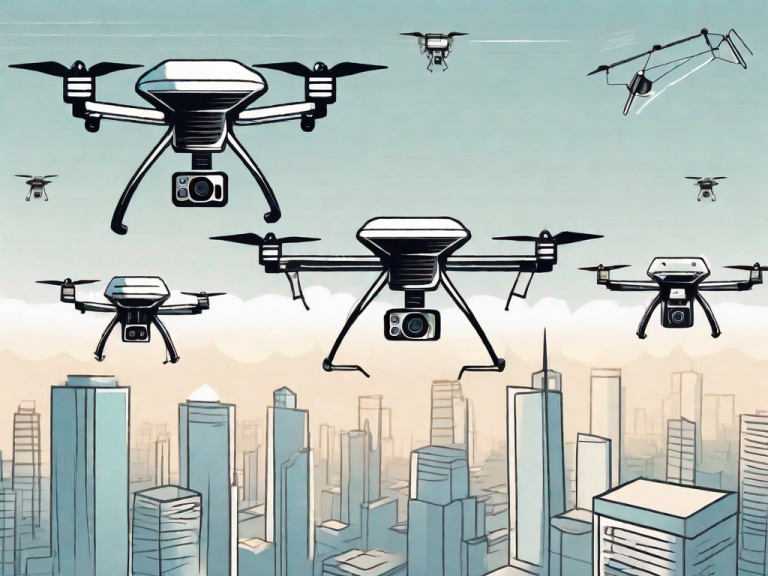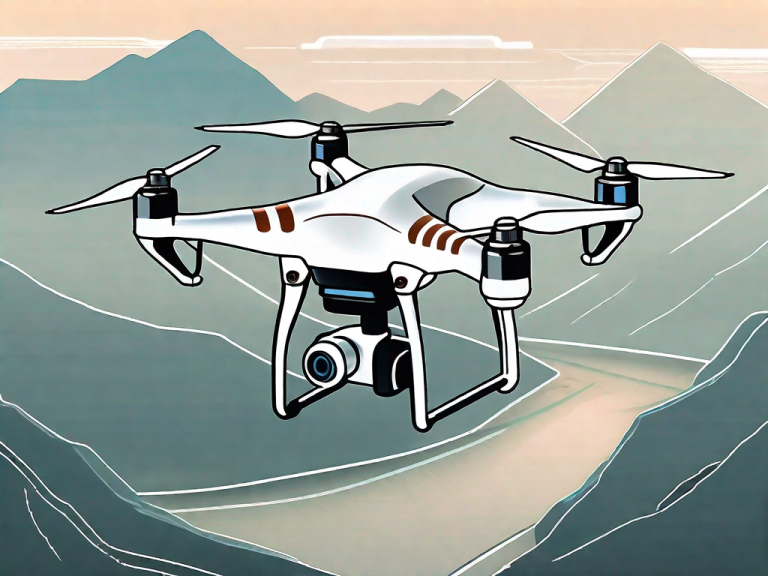Looking for the best 250G drone? You’ve come to the right place! In this article, we’ll dive into the world of 250G drones and explore what makes them so popular among drone enthusiasts. From understanding the category to the top drones in the market, safety regulations, maintenance tips, and enhancing your drone experience, we’ve got you covered.
Understanding the 250G Drone Category
What Makes a Drone 250G?
First things first, let’s break down what exactly makes a drone fall into the 250G category. The weight of a drone is a crucial factor when it comes to regulations and overall performance. A 250G drone refers to a drone that weighs 250 grams or less. These drones are lightweight and compact, making them easy to carry around and maneuver in various terrains.
When it comes to the 250G drone category, manufacturers have to carefully design and engineer their drones to meet the weight requirement. This often involves using lightweight materials such as carbon fiber or high-grade plastics. These materials not only reduce the weight of the drone but also ensure its durability and strength.
Despite their small size, 250G drones are packed with advanced technology. They often feature powerful brushless motors that provide efficient and responsive flight performance. These motors, combined with high-performance propellers, allow the drone to achieve impressive speeds and maneuverability.
In addition to their lightweight design, 250G drones are also equipped with a range of sensors and stabilization systems. These include GPS, gyroscopes, and accelerometers, which help the drone maintain stability and precise control during flight. Some models even come with obstacle avoidance systems, further enhancing their safety and ease of use.
Why Choose a 250G Drone?
Now that we know what defines a 250G drone, let’s explore why you should consider getting one. One of the key advantages of a 250G drone is its portability. These drones are small and lightweight, allowing you to take them on your outdoor adventures without much hassle. Whether you’re hiking, biking, or traveling, a 250G drone can easily fit into your backpack or carry-on luggage.
Despite their compact size, 250G drones are often equipped with advanced features, rivaling larger and heavier drones in terms of performance and capabilities. Many models offer high-resolution cameras, capable of capturing stunning aerial footage and photos. Some drones even come with built-in gimbals, ensuring smooth and stable footage even in challenging conditions.
Another advantage of 250G drones is their affordability. Compared to larger and more professional-grade drones, 250G drones are generally more budget-friendly. This makes them a great option for beginners or hobbyists who are looking to explore the world of drones without breaking the bank.
Furthermore, due to their lightweight design, 250G drones often have longer flight times compared to heavier drones. This means you can enjoy more time in the air, capturing breathtaking views and exploring new perspectives. Additionally, their compact size allows for quicker and easier setup, so you can spend less time preparing and more time flying.
In conclusion, the 250G drone category offers a range of benefits, from portability and advanced features to affordability and longer flight times. Whether you’re a beginner or an experienced pilot, a 250G drone can be a great choice for capturing stunning aerial footage and exploring the world from a new perspective.
Features to Consider in a 250G Drone
When it comes to choosing a 250G drone, there are several features that you should consider to ensure that you get the best possible experience. In addition to the basic specifications, such as weight and size, there are a few key features that can greatly enhance your drone flying and photography experience.
Camera Quality
One of the most important features to look for in a 250G drone is the camera quality. Whether you’re a professional photographer or simply want stunning aerial shots, a high-resolution camera is a must. Look for drones that offer at least 4K resolution and adjustable settings for capturing the perfect shots.
With a high-resolution camera, you’ll be able to capture every detail in your aerial photographs and videos. Whether you’re capturing landscapes, wildlife, or even just your own adventures, having a camera that can produce sharp and vibrant images will make a world of difference.
Additionally, consider drones that offer features like image stabilization and different shooting modes. These features can help you capture smooth and professional-looking footage, even in challenging conditions.
Flight Time
Flight time is another vital factor to consider when choosing a 250G drone. Look for drones that offer a decent flight time, preferably above 20 minutes. This will give you ample time to explore the skies and capture breathtaking footage without constantly worrying about battery life.
Having a longer flight time means that you can spend more time in the air, allowing you to cover more ground and capture a wider variety of shots. Whether you’re exploring a scenic location or tracking a moving subject, having a longer flight time will give you more opportunities to get the perfect shot.
It’s also worth considering drones that offer swappable batteries. This way, you can carry extra batteries with you and easily swap them out when one runs out of power, extending your flight time even further.
Control Range
Control range refers to the maximum distance between the drone and the controller. A wider control range allows you to fly your drone further and explore vast areas. Look for drones that offer a control range of at least 2 kilometers to enjoy uninterrupted flights.
With a wider control range, you’ll have the freedom to fly your drone to greater distances, capturing shots that were previously out of reach. Whether you’re exploring remote locations or simply want to get a different perspective on familiar surroundings, a wider control range will open up new possibilities for your aerial photography.
It’s important to note that control range can be affected by various factors, such as interference from other devices or obstacles in the environment. Therefore, it’s always a good idea to fly your drone in open areas with minimal interference to maximize the control range.
Overall, when choosing a 250G drone, it’s important to consider the camera quality, flight time, and control range. By finding a drone that excels in these areas, you’ll be able to capture stunning aerial shots and have an unforgettable drone flying experience.
Top 250G Drones in the Market
When it comes to drones, there are countless options available in the market. However, if you are specifically looking for drones that weigh around 250 grams, you are in luck! In this article, we will be exploring the top 250G drones that are currently dominating the market.
Drone 1 Review
Let’s start with Drone 1, a popular choice among drone enthusiasts. This sleek and compact drone offers an impressive flight time of up to 30 minutes, thanks to its powerful battery. Equipped with a high-resolution camera, Drone 1 allows you to capture stunning aerial shots and videos with ease. Its advanced stabilization technology ensures smooth and steady footage, even in windy conditions. With its user-friendly interface and intuitive controls, Drone 1 is suitable for both beginners and experienced pilots.
Not only does Drone 1 excel in performance, but it also boasts a durable build quality. Its lightweight yet sturdy frame can withstand minor crashes and bumps, making it a reliable companion for your aerial adventures. Additionally, this drone comes with a range of intelligent flight modes, such as follow-me mode and waypoint navigation, allowing you to capture creative shots effortlessly.
Drone 2 Review
Next up is Drone 2, a top contender in the 250G drone category. This drone stands out with its exceptional flight stability, thanks to its advanced GPS and altitude hold features. Whether you are a professional photographer or an aspiring filmmaker, Drone 2 offers a wide range of creative possibilities. Its high-quality camera delivers stunning 4K resolution footage, ensuring every detail is captured with precision.
Drone 2 also comes equipped with intelligent flight modes, such as orbit mode and gesture control, making it a breeze to capture unique shots. With its compact design, this drone is highly portable, allowing you to take it anywhere you go. Whether you are exploring breathtaking landscapes or documenting special events, Drone 2 is a reliable companion that will elevate your aerial photography and videography to new heights.
Drone 3 Review
Last but not least, let’s delve into the features of Drone 3, another impressive 250G drone in the market. This drone boasts an exceptional flight range, allowing you to explore vast areas and capture stunning footage from different perspectives. With its advanced obstacle avoidance system, Drone 3 ensures a safe and worry-free flying experience.
Drone 3 is equipped with a high-resolution camera that delivers crystal-clear images and videos. Its gimbal stabilization system ensures smooth and professional-looking footage, even during fast-paced flights. Whether you are a professional aerial photographer or a hobbyist looking to capture breathtaking shots, Drone 3 offers a range of shooting modes and features to cater to your creative needs.
In conclusion, the market for 250G drones is filled with incredible options. Drone 1, Drone 2, and Drone 3 are just a few examples of the exceptional drones available in this category. Each drone offers unique features and capabilities that cater to different user preferences. Whether you are a beginner or an experienced pilot, these drones are sure to elevate your aerial photography and videography to new heights.
Safety and Regulations for 250G Drones
Understanding Drone Laws
Before taking your 250G drone to the skies, it’s important to familiarize yourself with the drone laws and regulations in your area. Different countries and jurisdictions may have specific rules regarding drone usage, including airspace restrictions, registration requirements, and flight limitations. Stay informed and fly responsibly to ensure a safe and legal drone flying experience.
Drone laws are put in place to ensure the safety and privacy of individuals and property. In some countries, drones are classified based on their weight, with the 250G category being one of the common classifications. These laws help prevent accidents and incidents that could occur if drones were flown without any restrictions.
When it comes to airspace restrictions, it’s important to understand the different types of airspace and their regulations. Controlled airspace, such as airports and military bases, have strict rules that prohibit drone flights. It’s crucial to respect these restrictions to avoid endangering manned aircraft and compromising national security.
Registration requirements vary from country to country. Some jurisdictions require drone owners to register their drones with the aviation authority or a designated regulatory body. This registration process helps authorities keep track of drone ownership and ensures accountability in case of any violations or accidents.
Flight limitations may include altitude restrictions, no-fly zones, and restrictions on flying near sensitive areas such as government buildings, schools, and hospitals. These limitations are in place to protect the privacy and safety of individuals on the ground.
Safety Precautions for 250G Drones
While flying a 250G drone can be exciting, it’s crucial to prioritize safety. Here are some essential safety precautions to keep in mind:
- Always fly in an open and unobstructed area away from people, buildings, and power lines.
- Keep your drone within your line of sight at all times. This allows you to have better control over the drone and avoid potential collisions.
- If possible, avoid flying in adverse weather conditions such as strong winds or heavy rain. These conditions can affect the stability and maneuverability of the drone.
- Regularly inspect your drone for any signs of damage or wear and tear. Check the propellers, motors, and other components to ensure they are in good working condition.
- Follow manufacturer guidelines for battery charging and storage. Improper handling of batteries can lead to accidents such as fires or explosions.
Additionally, it’s important to consider the privacy of others when flying your drone. Avoid flying over private properties without permission and respect the privacy of individuals. Always be mindful of your surroundings and the potential impact your drone may have on others.
Furthermore, it’s recommended to have liability insurance coverage for your drone. Accidents can happen, and having insurance can provide financial protection in case of any damages or injuries caused by your drone.
By following these safety precautions and adhering to the regulations in your area, you can enjoy flying your 250G drone while ensuring the safety of yourself, others, and the environment.
Maintenance Tips for 250G Drones
When it comes to owning a 250G drone, proper maintenance is key to ensuring optimal performance and longevity. In addition to the basic care and maintenance, there are a few specific areas that require attention to keep your drone in top shape.
Battery Care
One of the most important aspects of drone maintenance is taking care of its battery. The battery is the lifeblood of your drone, and if not properly cared for, it can significantly impact its overall lifespan. To ensure your drone’s battery lasts as long as possible, it is crucial to avoid both overcharging and over-discharging.
Overcharging the battery can cause it to overheat and potentially even catch fire. On the other hand, over-discharging the battery can lead to irreversible damage and reduce its overall capacity. To prevent these issues, it is recommended to use a smart charger that automatically stops charging when the battery is full.
Investing in spare batteries is also a wise decision for drone enthusiasts. Having extra batteries on hand allows you to extend your flying time without having to wait for a single battery to recharge. When not in use, it is important to store the batteries in a cool and dry place to prevent any damage or degradation.
Propeller Maintenance
The propellers of your 250G drone play a crucial role in flight stability and maneuverability. Regularly inspecting and maintaining the propellers is essential to ensure safe and smooth flights.
Before each flight, take a close look at the propellers for any signs of cracks or damage. Even the smallest crack can compromise the structural integrity of the propeller, leading to potential mid-air failures. If you notice any damage, it is crucial to replace the propeller before flying again.
In addition to inspecting for damage, it is also important to clean the propellers after each flight. During flight, the propellers can accumulate dirt, dust, and debris, which can affect their performance. Cleaning them with a soft brush or cloth will help remove any particles and ensure smooth rotation during future flights.
Properly maintaining your 250G drone’s propellers will not only enhance flight stability but also contribute to the overall longevity of your drone.
By following these maintenance tips, you can ensure that your 250G drone remains in excellent condition, allowing you to enjoy countless hours of safe and exciting flights. Remember, regular care and attention to detail will go a long way in preserving the performance and lifespan of your drone.
Enhancing Your Drone Experience
Drone Accessories
To take your drone experience to the next level, consider investing in some useful accessories. These may include additional batteries, carrying cases, propeller guards, ND filters for better aerial photography, and even VR goggles for an immersive first-person view flying experience. Explore the market and find accessories that suit your needs and preferences.
Advanced Flying Techniques
Once you’ve mastered the basics of flying your 250G drone, it’s time to take it up a notch with advanced flying techniques. Experiment with different flight modes, such as sport mode or waypoint navigation, to enhance your flying skills and capture unique shots. Join online communities and forums to connect with fellow drone enthusiasts and share tips and tricks.
FAQs:Q: Are 250G drones suitable for beginners?
A: Yes, 250G drones are a great option for beginners due to their compact size, ease of use, and affordability.
Q: Can I fly my 250G drone at night?
A: Flying drones at night is subject to local regulations. In many areas, flying drones at night is allowed as long as you have proper lighting on your drone.
Q: How much range can I expect from a 250G drone?
A: The control range of a 250G drone can vary depending on the model and environmental conditions, but most offer a range of around 2 kilometers.
Q: Are there any specific maintenance requirements for 250G drones?
A: Regular cleaning, propeller inspection, and battery care are essential maintenance tasks for 250G drones. Refer to your drone’s user manual for manufacturer-specific guidelines.
Q: Can I attach a GoPro or other action cameras to a 250G drone?
A: While some 250G drones come with built-in cameras, others may allow you to attach action cameras like GoPro. Check the drone’s specifications and compatibility before attaching any external camera.
Q: What flight modes do 250G drones offer?
A: Many 250G drones offer various flight modes, including GPS, follow me, orbit mode, and waypoint navigation, to assist in capturing unique shots and achieving smooth flight paths.
Q: How do I ensure the privacy of others while flying a 250G drone?
A: Always fly responsibly and respect the privacy of others. Avoid flying over private properties without permission and adhere to local regulations regarding privacy and drone usage.









